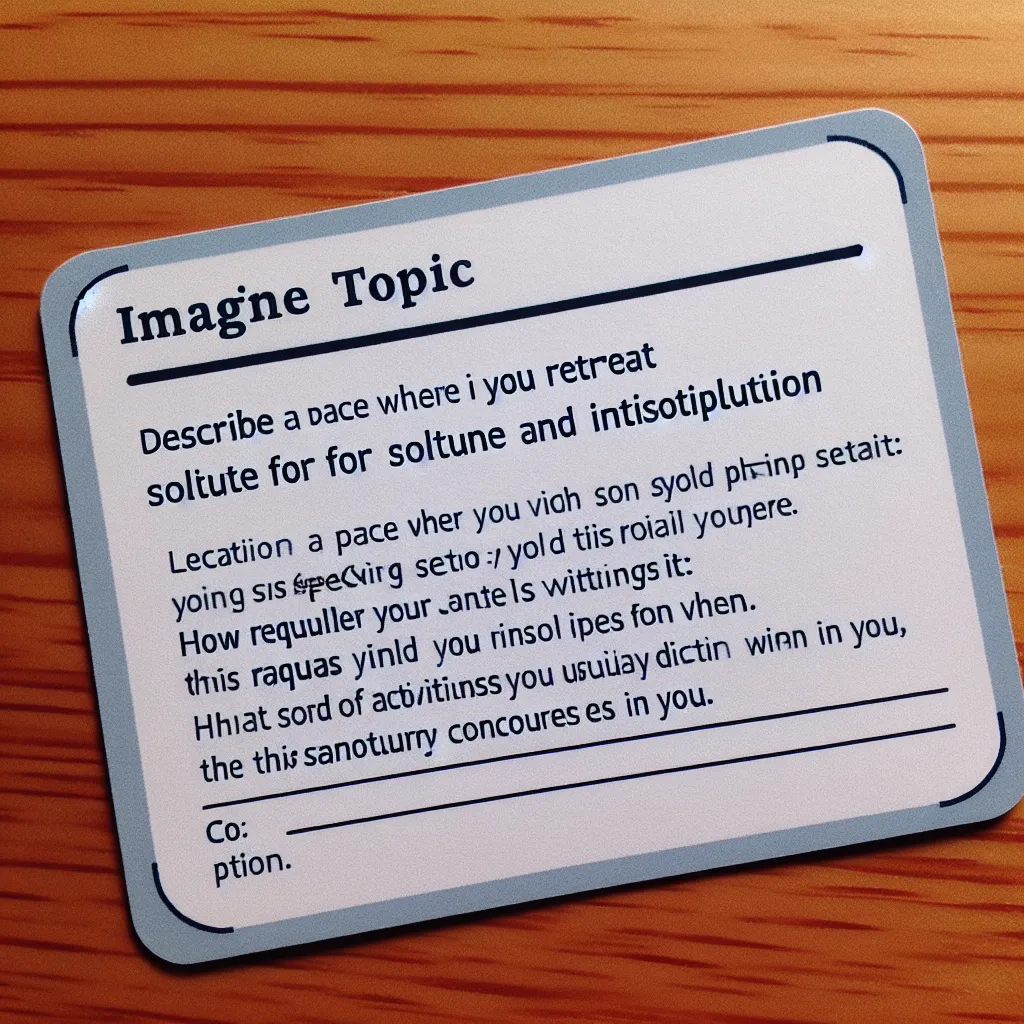As an experienced IELTS Speaking examiner, I’ve seen countless candidates struggle with describing complex situations. This task often appears in Part 2 of the IELTS Speaking test and can be challenging for many test-takers. In this article, we’ll explore how to effectively tackle this topic and provide sample answers that can help you achieve a high band score.
Nội dung bài viết
Understanding the Task
Before we dive into the specifics, it’s crucial to understand what the examiners are looking for when they ask you to “Describe a time when you had to deal with a complex situation.” This topic tests your ability to:
- Recall and narrate a specific experience
- Explain the complexity of the situation
- Describe your actions and thought processes
- Reflect on the outcome and lessons learned
 IELTS Speaking Test
IELTS Speaking Test
Part 1: Introduction and Interview
In Part 1, the examiner might ask some general questions related to dealing with complex situations. Here are a few examples:
- Do you often face complex situations in your daily life?
- How do you usually handle difficult problems?
- Do you think young people are good at solving complex issues?
Let’s look at a sample answer for the first question:
Examiner: Do you often face complex situations in your daily life?
Sample Answer (Band 6-7):
Yes, I do face complex situations sometimes. In my job, I often have to deal with challenging tasks that require careful thinking. Also, in my personal life, I sometimes have to make difficult decisions about my future plans.
Sample Answer (Band 8-9):
Absolutely, complex situations are an integral part of my daily life. In my professional capacity as a project manager, I frequently encounter multifaceted problems that demand a strategic approach. Similarly, in my personal life, I often find myself navigating intricate social dynamics or making pivotal decisions that have far-reaching consequences.
Part 2: Long Turn (Cue Card)
Now, let’s look at a potential cue card for this topic:
Describe a time when you had to deal with a complex situation
You should say:
- What the situation was
- When and where it happened
- Who was involved
- How you handled the situation
And explain why you consider it a complex situation.
Sample Answer (Band 6-7):
I’d like to talk about a complex situation I faced last year at my workplace. It was during a major project where we were developing a new software application for a client.
The situation arose when we were about halfway through the project. We suddenly discovered that the client’s requirements had changed significantly, which meant that much of the work we had already done needed to be revised.
This involved not just me, but my entire team of five developers, as well as our project manager and the client’s representatives.
To handle the situation, I first organized a team meeting to discuss the changes and their implications. We then prioritized the new requirements and divided the work among team members. I also had to negotiate with the client for an extension of the deadline.
I consider this a complex situation because it required balancing multiple factors – technical challenges, team dynamics, client expectations, and time constraints. It tested not only our technical skills but also our ability to adapt quickly and communicate effectively under pressure.
Sample Answer (Band 8-9):
I’d like to elucidate on a particularly intricate situation I encountered in my professional life approximately 18 months ago. The scenario unfolded during the implementation phase of a high-stakes software development project for a multinational corporation.
The complexity arose when, midway through the project lifecycle, we were confronted with a paradigm shift in the client’s requirements. This unforeseen development necessitated a substantial overhaul of our existing codebase and architecture.
The situation involved a diverse group of stakeholders, including my team of five senior developers, our project manager, the client’s IT department, and their C-suite executives.
To navigate this labyrinthine challenge, I initially convened an emergency strategy session with my team to conduct a comprehensive impact analysis. Subsequently, we formulated a adaptive action plan, prioritizing the new requirements based on their criticality and interdependencies. I personally spearheaded negotiations with the client to secure a revised timeline and additional resources.
This situation epitomizes complexity due to its multifaceted nature, encompassing technical intricacies, interpersonal dynamics, and high-pressure decision-making. It demanded not only technical prowess but also strategic thinking, diplomatic finesse, and the ability to maintain composure in the face of significant uncertainty.
Follow-up Questions
- How did this experience change your approach to project management?
- What was the most challenging aspect of dealing with this situation?
Sample Answer (Band 6-7):
This experience taught me the importance of flexibility in project management. Now, I always try to anticipate potential changes and have backup plans ready. The most challenging aspect was keeping the team motivated despite the setbacks.
Sample Answer (Band 8-9):
This experience was a catalyst for transformation in my project management philosophy. It underscored the paramount importance of agility and robust contingency planning. I’ve since implemented proactive risk assessment protocols and fostered a culture of adaptive resilience within my teams. The most formidable challenge was maintaining team cohesion and morale in the face of significant adversity, which required nuanced leadership and emotional intelligence.
Part 3: Two-way Discussion
In Part 3, the examiner will ask more abstract questions related to the topic. Here are some examples:
Examiner: Do you think modern life is becoming more complex? Why or why not?
Sample Answer (Band 6-7):
Yes, I believe modern life is becoming more complex. With the rapid advancement of technology, we have to constantly learn new skills and adapt to new ways of doing things. Also, globalization has made our world more interconnected, which means we often have to deal with diverse cultures and viewpoints in our daily lives and work.
Sample Answer (Band 8-9):
Undoubtedly, the trajectory of modern life is towards increasing complexity. This is primarily driven by the exponential pace of technological innovation, which necessitates continuous upskilling and adaptation. Furthermore, the pervasive influence of globalization has created a highly interconnected world, where we must navigate a labyrinth of cultural nuances and conflicting ideologies. This complexity is further compounded by the information overload we face daily, requiring sophisticated critical thinking skills to discern truth from misinformation.
Examiner: How can education systems better prepare young people to handle complex situations?
Sample Answer (Band 6-7):
Education systems can better prepare young people by focusing more on problem-solving skills. Schools should give students more real-world projects to work on, where they can practice dealing with complex situations. Also, teaching critical thinking and teamwork is important, as these skills are often needed in complex situations.
Sample Answer (Band 8-9):
Education systems can revolutionize their approach by pivoting towards a more holistic and experiential learning model. This would entail integrating real-world complexity into the curriculum through immersive problem-based learning scenarios. Additionally, there should be a concerted effort to cultivate meta-cognitive skills, enabling students to reflect on their thinking processes. Emphasizing interdisciplinary studies can also equip young minds with the versatility needed to tackle multifaceted challenges. Furthermore, fostering emotional intelligence and resilience is crucial, as these are often the linchpins in successfully navigating complex situations.
Key Vocabulary and Phrases
To achieve a high band score, it’s essential to use a range of sophisticated vocabulary and phrases. Here are some examples:
-
Multifaceted [mʌltiˈfæsɪtɪd] (adjective): Having many different aspects or features.
Example: The project was multifaceted, requiring expertise from various departments. -
To navigate [ˈnævɪgeɪt] (verb): To find a way through a difficult or complicated situation.
Example: We had to navigate through numerous challenges to complete the project. -
Paradigm shift [ˈpærədalm ʃɪft] (noun): A fundamental change in approach or underlying assumptions.
Example: The new technology caused a paradigm shift in how we approach data analysis. -
To spearhead [ˈspɪəhed] (verb): To lead an attack or an important movement or activity.
Example: Sarah spearheaded the initiative to revamp our customer service procedures. -
Labyrinthine [ˌlæbəˈrɪnθaɪn] (adjective): Complicated and difficult to understand.
Example: The legal process was labyrinthine, requiring expert guidance at every step.
Examiner’s Advice
To excel in describing complex situations in the IELTS Speaking test:
- Practice narrating personal experiences in detail.
- Focus on explaining your thought process and actions clearly.
- Use a range of sophisticated vocabulary and complex sentence structures.
- Be prepared to discuss abstract ideas related to complexity in Part 3.
- Maintain fluency by using appropriate linking words and phrases.
Remember, the key to success lies in regular practice and expanding your vocabulary. Good luck with your IELTS preparation!
For more tips on acing the IELTS Speaking test, check out our guides on describing a time when you had to stay focused and handling major changes.


